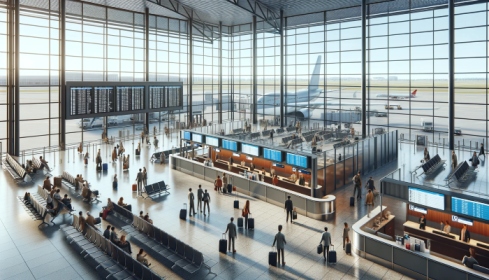Monday, September 9, 2024 As air travel continues to grow, airlines are grappling with a rising number of incidents involving devices powered by lithium-ion batteries overheating mid-flight that casues even emergency landing. According to a recent report by UL Standards, such overheating events have increased by 28% between 2019 and 2023. While these occurrences are still considered rare, they have become a significant safety concern for airlines.
Lithium-ion batteries, commonly found in electronic devices like laptops, smartphones, and e-cigarettes, can experience a phenomenon called thermal runaway. This happens when a battery overheats, leading to a fire or explosion. According to the report, 35 airlines reported an increase in such incidents, with e-cigarettes overheating more frequently than any other device.

One key factor contributing to the rising risk is passengers placing lithium-ion-powered devices, such as portable chargers and vaping products, in their checked luggage, which is against federal rules. Fires that start in the cargo hold can be more dangerous because they may not be detected as quickly, increasing the chances of a catastrophic event. Category Details Lithium-Ion Battery Incidents Overheating events up by 28% from 2019 to 2023.
E-cigarettes lead in incidents, especially in-flight. Devices at Risk Laptops, smartphones, e-cigarettes, and portable chargers with lithium-ion batteries. Common Causes of Risk Passengers placing lithium-powered devices in checked luggage, violating federal rules.
Real-Life Incidents Smoking laptop evacuation at San Francisco Airport (July 2023); emergency landing in Jacksonville (2022). E-Cigarettes Concerns Identified as the most frequent cause of overheating incidents. Passenger Misbehavior Over a quarter of passengers place vaping devices and chargers in checked bags, against regulations.
Airline Safety Responses Airlines remind passengers to keep devices in carry-on bags, deploy fire containment bags on flights. Airline Operational Changes Singapore Airlines and Scoot hold 57% of Melbourne-Singapore seats; Emirates holds 11%. Turkish Airlines Expansion Turkish Airlines operates 3 weekly flights between Melbourne and Istanbul via Singapore; planning non-stop flights.
Turkish Airlines Growth Increased weekly flights from 21 to 35 by 2025 under bilateral agreements and fifth freedom rights. Real-Life Incidents: Alarming Examples of Battery Fires Recent incidents highlight the growing danger posed by lithium-ion batteries on flights. In July 2023, a laptop stored in a passenger’s bag began smoking while a plane was waiting for takeoff at San Francisco International Airport.
The incident led to an evacuation, demonstrating the severity of the risk. Last year, a flight traveling from Dallas to Orlando had to make an emergency landing in Jacksonville after a battery caught fire in an overhead bin. These cases emphasize the potential risks of devices overheating onboard and how crucial it is for airlines and passengers to follow safety protocols.
The report found that in 60% of cases, overheating occurred near the seat of the passenger who brought the device on board. Safety Concerns Around E-Cigarettes and Portable Chargers E-cigarettes, which contain lithium-ion batteries, have become a particular concern for airlines. They have been identified as the most frequent cause of overheating incidents.
More than a quarter of passengers surveyed admitted to placing vaping devices and portable chargers in their checked luggage, which is a violation of federal aviation regulations. This behavior raises serious safety concerns, as fires caused by such devices can quickly escalate if not detected in time. According to aviation safety experts, it is vital for passengers to be educated about the dangers of placing such devices in checked baggage and for airlines to enforce safety regulations strictly.
Airlines Responding to the Growing Risk Airlines are responding to these rising safety concerns by implementing stricter safety measures, such as reminding passengers to carry devices powered by lithium-ion batteries in their carry-on luggage. The goal is to ensure that if an overheating incident occurs, flight attendants can quickly address the situation before it becomes a significant hazard. Some airlines have also equipped their staff with fire containment bags to handle battery fires during flights.
However, experts stress that passenger awareness and compliance with safety rules remain essential to mitigating the risks posed by these devices. The Broader Context: Airline Operations and Route Changes While battery safety is a growing concern for airlines, there are also broader operational shifts in the airline industry. For instance, Singapore Airlines and its low-cost subsidiary Scoot currently hold a commanding 57% share of seats on the Melbourne-Singapore route, with Emirates holding around 11%.
Emirates, which used to operate Brisbane-Singapore flights, ended that route in 2019, and the carrier does not operate between Sydney or Perth and Singapore either. However, Emirates continues to connect Singapore with Christchurch via Sydney. Turkish Airlines has also made significant strides in expanding its presence in the region.
The Turkish flag carrier introduced three weekly flights between Melbourne and Istanbul via Singapore in March, operating A350-900s on this route. The airline plans to eventually offer non-stop services once it receives longer-range A350-1000s capable of flying directly between Istanbul and Australia’s east coast. Under bilateral air service agreements, Turkish Airlines was granted 21 weekly flights in December 2023, which will increase to 28 later in 2024 and eventually 35 in 2025.
Additionally, Turkish Airlines holds fifth freedom rights that allow it to operate flights via Singapore, further expanding its route network. Conclusion: The Path Forward As lithium-ion battery incidents continue to rise, airlines must take proactive steps to mitigate the risk and ensure the safety of passengers and crew. Stricter enforcement of safety regulations, passenger education, and the use of fire containment tools are just a few of the measures being implemented to address this issue.
Meanwhile, the changing dynamics in international routes, with airlines like Turkish Airlines and Emirates reshaping their offerings, underscore the constantly evolving nature of the global aviation industry. As the world adjusts to new travel norms and safety protocols, passengers must remain vigilant about adhering to safety regulations to prevent dangerous incidents involving lithium-ion batteries..



















